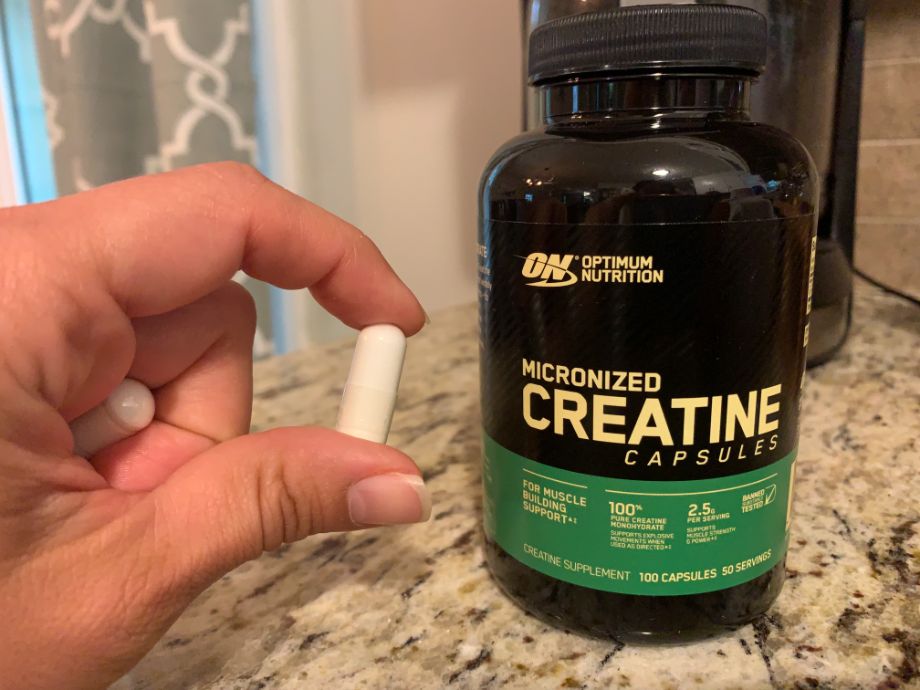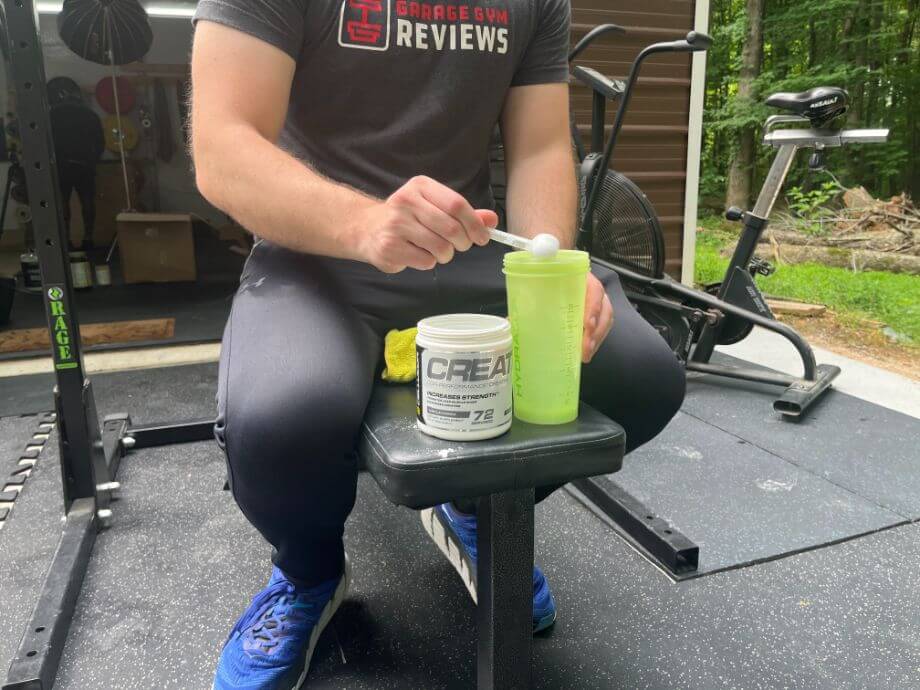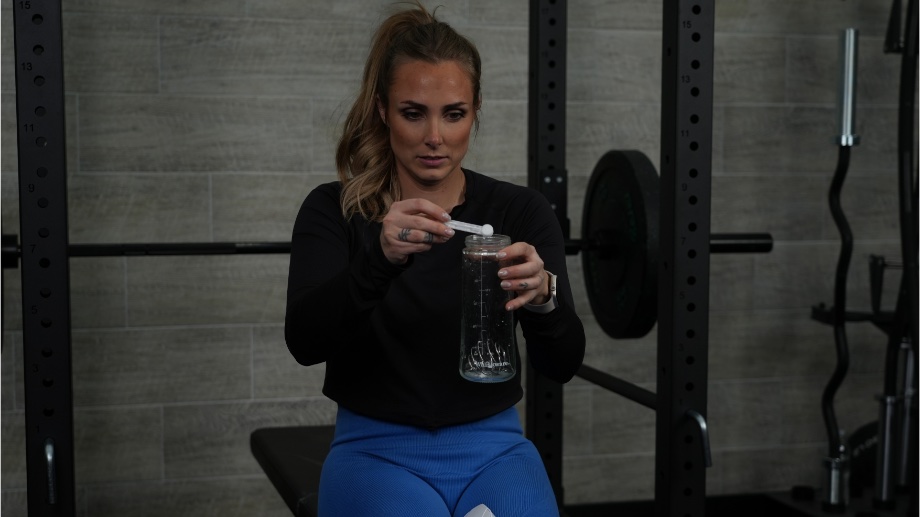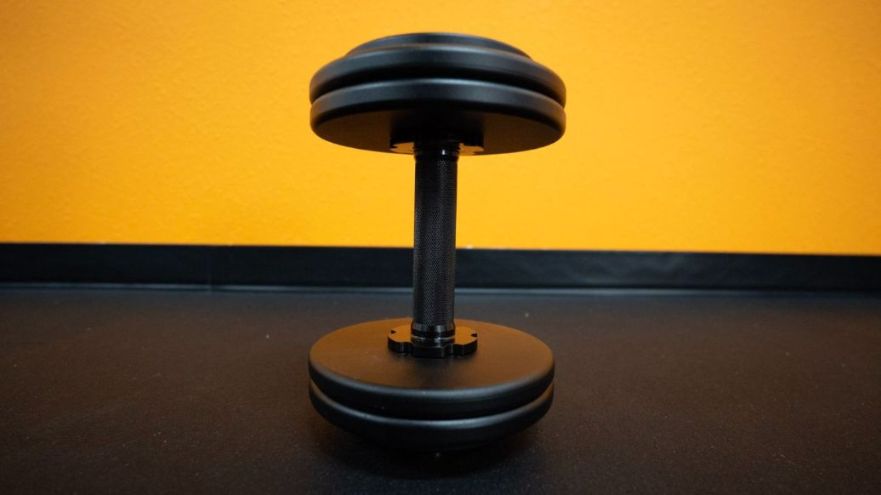As avid athletes, we know how important it is to fuel our bodies for peak exercise performance. Well-balanced nutrition and good sleep hygiene go a long way, but sports supplements can come in handy when we need that extra boost. So, on that note, let’s give a warm hello to my friend, creatine.
RELATED: What Is Creatine?
Research has shown1 that creatine can improve athletic performance, strength, and muscle growth, in addition to many other health benefits. Turns out it can support more than just the bodybuilding community, as we once thought. And while creatine is one of the more affordable sports nutrition supplements on the market today, the option to buy in bulk is always there. But does creatine expire?
Short answer—yes, but no. You’ll find an expiration date on that new tub of creatine, but research has shown that it has a super long shelf life that may go beyond the printed date. I know it’s a little contradictory. Not to worry—we’ll break it down for you here.
Medical disclaimer: This article is intended for educational and informational purposes only. It is not intended as a substitute for medical advice. For health advice, contact a licensed healthcare provider.
Does Creatine Expire?
Most creatine supplements are sold with a printed expiration date, but does creatine go bad? Research indicates their shelf life may actually extend far beyond the expiry date.
Many different types of creatine are available, but the powder form of creatine monohydrate tends to be the most stable. Other forms, like liquid creatine and creatine ethyl ester, are less stable and more likely to break down into waste products after their expiration dates. Keep this in mind when shopping for the best creatine supplement for your needs.

How Long Does Creatine Last?
Although most creatine supplements show an expiration date within 2-3 years of production, studies have shown that they can actually last much longer. Creatine monohydrate is especially stable and unlikely to break down into its waste product, creatinine.
Why do we want to keep our creatine from turning into creatinine? Unfortunately, creatinine is much less potent and less likely to offer the same benefits as creatine.
Research has shown that creatine monohydrate typically doesn’t show signs of degradation2 even after three years and exposure to high temperatures. So it’s a safe bet that creatine monohydrate supplements could last at least 1-2 years past their printed expiry dates. This is, of course, as long as you store your supplement correctly. But we’ll get to more of that later.
Other forms of creatine, on the other hand, don’t offer the same shelf life. For example, liquid creatine supplements typically don’t last long past their expiration dates. Same for creatine salts, which have reduced stability compared to creatine monohydrates. However, adding carbohydrates may help increase the stability of creatine salts—an important factor if your pre-workout is your creatine source.
RELATED: Best Pre-Workout with Creatine
Still, no matter the type of creatine, when in doubt, throw it out.
What is Creatine?
Creatine is an amino acid derivative synthesized3 from the amino acids arginine and glycine. It plays a major role in our cells’ energy metabolism and helps create a steady stream of energy in our muscles. Creatine occurs naturally in our muscle cells, but we can also obtain it from outside sources like meat, fish, animal milk, and dietary supplements.
When we consume creatine, it’s transported to our muscles and stored as phosphocreatine. When our workouts demand a boost of energy, we can tap into these phosphocreatine stores to keep us moving. But it’s actually a little more complex than that. Let’s break it down.

Adenosine triphosphate is the body’s main source of energy. When we hit the gym and exhaust our ATP stores, we have to create more to keep powering through our workout. Enter phosphocreatine. Our bodies use those phosphocreatine stores to generate more ATP. So, by building our creatine stores, we’re more likely to train harder and for more extended periods.
Creatine supplements come in many forms, including but not limited to:
- Creatine monohydrate powder: As one of the most popular forms of creatine supplementation, creatine monohydrate is widely studied. It is simply creatine with one water molecule attached.
- Creatine hydrochloride: Creatine with hydrochloride attached makes creatine HCL. The attached hydrochloride may enhance water solubility and improve your body’s creatine absorption.
- Creatine ethyl ester: Attach an ester to creatine monohydrate, and you have creatine ethyl ester. The ester may help decrease bloating, but the ethyl may accelerate creatine’s breakdown.
- Liquid creatine: There is limited research regarding ready-to-drink creatine supplements, but it appears that creatine may break down when it remains in liquid for several days.
Benefits of Creatine
Studies have shown4 that there are several creatine benefits for those of us who work out regularly. Let’s talk about some of the potential perks that may come with increasing the body’s creatine stores:
Improved Exercise Performance
Improved athletic performance is a significant benefit of creatine supplementation. We’re logging these workouts to get stronger and healthier, right? Creatine can raise anabolic states and improve cell signaling, helping you train longer and harder.
Enhanced Post-Exercise Recovery
Current evidence suggests that creatine supplementation may reduce muscle damage and enhance recovery after intense exercise.
Increased Muscle Mass
If you want to build muscle, creatine may be an important addition to your wellness routine. Research continues to point to a link between creatine supplementation and improved strength and increased muscle mass.1

Injury Prevention
Studies have shown5 that supplementing with creatine may reduce episodes of dehydration and muscle cramping, reducing your risk of injury.
RELATED: How Much Water Should You Drink with Creatine?
Brain Health Support
While there’s still a need for continued research, creatine’s benefits may also extend to our brain health6. Creatine supplementation may help support cognitive processing, brain function, and recovery from trauma. Potential to think more clearly during my workout? Sign me up!
Can Taking Expired Creatine Make You Sick?
Generally speaking, creatine is well-studied7 and considered safe for the average healthy adult. Still, it’s essential to know when to toss your creatine and opt for a new tub to avoid getting sick.
Since it’s a reasonably stable product, it’s not likely to cause unwanted side effects when taken after its expiration date. However, don’t ignore your common sense. Any changes in smell, taste, color, or consistency may indicate it’s time for a new tub. If you have concerns about its safety, there’s no harm in tossing your creatine and opening a new container.
Fun fact: clumpy creatine isn’t uncommon. If you notice clumps in your creatine supplement, it has likely been exposed to moisture at some point, and creatine molecules are just bunched together—typically no cause for alarm.
RELATED: Does Protein Powder Expire?
How to Store Creatine
Proper storage is key to extending the shelf life of creatine supplements long after their listed expiration date. To get the most out of your creatine products, keep them in an airtight container in a cool, dry place.
Prolonged contact with moisture can cause creatine to break down into creatinine. Also, try to keep your creatine out of direct sunlight, as the high temperatures and UV exposure may cause the supplement to break down faster.
Does Creatine Expire? Final Thoughts
While creatine does eventually go bad, research indicates it’s probably long after its printed expiration date. From the date of manufacture, most creatine supplements can last at least another year or two before it’s time to throw them out.
However, it’s always better to be safe than sorry. If you think your creatine supplement might be rancid, go ahead and toss it. And if you have questions about your supplement routine, consider meeting with a registered dietitian to address your individualized needs.
- Some forms of creatine supplements are more stable than others.
- Creatine monohydrate tends to be the most stable form of creatine.
- Creatine can often be consumed safely even after its posted expiration date.
- Creatine supplements may lose their potency after their expiry dates but typically do not cause unwanted side effects.
- Be sure to store your creatine properly to extend its shelf life.
- Keep your creatine in a cool, dry place, sealed tight and away from moisture and extreme temperatures.
Does Creatine Expire? FAQs
Does creatine expire or go bad?
Creatine does eventually expire, but research indicates it’s probably years after its printed expiration dates. It’s important to store your creatine supplements in a cool, dry place to avoid prolonged exposure to high temperatures or moisture.
How do I know if my creatine is bad?
Shelf life may vary depending on the type of creatine you have. The most common, creatine monohydrate, is typically safe for at least 1 to 2 years after its expiration date. Thankfully, creatine is one of the more budget-friendly dietary supplements available. So, if you have concerns about its safety, don’t hesitate to throw it away and open a new tub.
Is it bad if my creatine is clumpy?
Clumpy creatine isn’t all that uncommon. If you notice hard spots in your creatine supplements, the powder was likely exposed to moisture at some point. This isn’t typically a cause for alarm, but make sure it doesn’t show signs of deterioration, like changes in smell, taste, or color.
Can you take creatine for more than 5 years?
Long-term creatine usage is typically safe when taken at the recommended dosage of 3 to 5 grams.
These statements have not been evaluated by the Food and Drug Administration. This product is not intended to diagnose, treat, cure, or prevent any diseases.
References
- Wu, S. H., Chen, K. L., Hsu, C., Chen, H. C., Chen, J. Y., Yu, S. Y., & Shiu, Y. J. (2022). Creatine Supplementation for Muscle Growth: A Scoping Review of Randomized Clinical Trials from 2012 to 2021. Nutrients, 14(6), 1255. https://doi.org/10.3390/nu14061255
- Jäger, R., Purpura, M., Shao, A., Inoue, T., & Kreider, R. B. (2011). Analysis of the efficacy, safety, and regulatory status of novel forms of creatine. Amino acids, 40(5), 1369–1383. https://doi.org/10.1007/s00726-011-0874-6
- Kreider, R. B., Jäger, R., & Purpura, M. (2022). Bioavailability, Efficacy, Safety, and Regulatory Status of Creatine and Related Compounds: A Critical Review. Nutrients, 14(5), 1035. https://doi.org/10.3390/nu14051035
- Kreider, R. B., Kalman, D. S., Antonio, J., Ziegenfuss, T. N., Wildman, R., Collins, R., Candow, D. G., Kleiner, S. M., Almada, A. L., & Lopez, H. L. (2017). International Society of Sports Nutrition position stand: safety and efficacy of creatine supplementation in exercise, sport, and medicine. Journal of the International Society of Sports Nutrition, 14, 18. https://doi.org/10.1186/s12970-017-0173-z
- Turnagöl, H. H., Koşar, Ş. N., Güzel, Y., Aktitiz, S., & Atakan, M. M. (2021). Nutritional Considerations for Injury Prevention and Recovery in Combat Sports. Nutrients, 14(1), 53. https://doi.org/10.3390/nu14010053
- Roschel, H., Gualano, B., Ostojic, S. M., & Rawson, E. S. (2021). Creatine Supplementation and Brain Health. Nutrients, 13(2), 586. https://doi.org/10.3390/nu13020586
- Antonio, J., Candow, D. G., Forbes, S. C., Gualano, B., Jagim, A. R., Kreider, R. B., Rawson, E. S., Smith-Ryan, A. E., VanDusseldorp, T. A., Willoughby, D. S., & Ziegenfuss, T. N. (2021). Common questions and misconceptions about creatine supplementation: what does the scientific evidence really show?. Journal of the International Society of Sports Nutrition, 18(1), 13. https://doi.org/10.1186/s12970-021-00412-w







